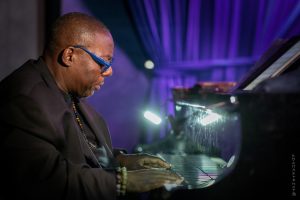Jazz and gospel pianist Cyrus Chestnut to appear at the Vermont Jazz Center in a trio setting, October, 14th, 2023 at 7:30 PM
The Vermont Jazz Center will present Cyrus Chestnut in a trio concert on October 14th at 7:30 PM. Called “the best pianist of his generation” by Time Magazine, Chestnut will appear with bassist Herman Burney and drummer Kelton Norris.
Chestnut’s repertoire includes selections from the Great American Songbook, spirituals, jazz standards, and original music as well as surprising transformations from other genres. Along with his interpretations of jazz-related gems, his recordings include compositions by Elvis Presley, Erik Satie and even Beethoven. Chestnut carefully arranges each piece, developing it with reharmonizations, introductions and interludes. His approach is characterized by two constants: a deep connection to gospel music and a resounding sense of swing.
As a youth Cyrus Chestnut was immersed in, and continues to follow, the spiritual beliefs of the Baptist church. His training as a musician followed a path from church musician to the Peabody Conservatory Preparatory Program and the Berklee College of Music. He quickly became knowns as a consummate sideman, touring the world and making recordings with jazz several jazz legends. He is now recognized as a leader in his own right. Chestnut currently holds the position of Master Instructor of Jazz Piano and Improvisation at Howard University. He continues to tour and record as a soloist, with his own groups, and as a high-level sideman at noted jazz festivals and venues.
At the root of Chestnut’s gift has always been a deep connection between jazz and God. “I believe the ability to play music is a gift from God and every time I play, I’m thankful. Every time I sit down to play, for me, is worship and expression,” he told Down Beat magazine. In an interview with iRockJazz.com, Chestnut reflected on the many musical skills he learned as a member of the church: “The church was a great training ground. It was an unspoken school, much like the Betty Carter and the Buhaina [Art Blakey] schools; the church taught me ear-training, how to improvise, and the principals of accompaniment. It was my job to figure out the keys and chords behind vocalists. People would sing in all twelve keys and modulate, and I’d have to follow them. Playing for the choir you had to give support. At the end of the preacher’s sermons I’d provide the musical ‘amen.’ You listen in church and use your ears, it wasn’t about you but what you could contribute to the whole.” This thread has continued throughout his career. In most of his albums as a leader he includes at least one spiritual. For example, on his most recent recording he pays a moving tribute to his recently departed father in a hauntingly beautiful solo version of the traditional hymn “I Must Tell Jesus.”
As a youth Chestnut continued to study the classics while holding his position as pianist and organist at the church. He then went on to study jazz composition and performance at Berklee, where he received the Eubie Blake fellowship, the Oscar Peterson scholarship and a Quincy Jones scholarship. After graduating from Berklee, Chestnut’s path led to stints as a sideman with vocalist Jon Hendricks in 1986-88, trumpeter Terrence Blanchard and saxophonist Donald Harrison in 1988-90, and Wynton Marsalis in 1991.
Soon after working with Marsalis, Chestnut joined forces with the legendary singer Betty Carter. Chestnut has often said that working with the National Medal of the Arts award-winning singer was his “graduate school.” He learned from her that “jazz is about finding out who you are.” Indeed, that notion of identifying his purpose in life has become Chestnut’s north star. In an interview with Neon Jazz, he tells a compelling story of how he internalized this lesson. He and Carter’s accompanying trio were warming up the audience for her concert by playing a scripted trio version of Miles Davis’ arrangement of “If I Were a Bell.” They played the classic arrangement “right down to the letter.” Carter glared at Chestnut as she entered the stage to sing. After they finished their set, Carter asked him to come to her dressing room where she tore into him: “I didn’t hire you to play something that I already know… Find a different way to play it, don’t just regurgitate the same thing.”
Chestnut reflected: “After that conversation I was forever changed. Even to this day, a mechanism goes off if I feel like I’m playing the same thing over and over again – it’s the voice of Betty yelling at me: ‘You need to think, don’t just play something that I’ve heard before.’ Jazz is a thinking person’s music. I’m now on a mission to find something different.”
Since his tenure with Betty Carter, Chestnut has worked with an array of leading musicians including saxophonists Vincent Herring, Steve Wilson, James Carter, Donald Harrison and Joe Lovano; trumpeters Roy Hargrove and Freddie Hubbard, as well as Chick Corea, Kevin Mahogany, Dee Dee Bridgewater, the Chicago Symphony Orchestra, the Boston Pops, and opera singer Kathleen Battle. In 1996 he appeared on the soundtrack to director Robert Altman’s feature film Kansas City (which also found Cyrus portraying a Count Basie-inspired pianist).
Chestnut’s music is a combination of several styles and influences, fused together through the filter of his intellect and heart. In the interview with Neon Jazz, Cyrus digs into that idea: “It’s so easy to be typecast as ‘the soulful guy.’ I appreciate that you know, I appreciate the consistency. But we grow. A baby doesn’t stay six months old for the rest of its life. They grow up! After a while we evolve. So, as I evolve, for sure the music is going to evolve.” Listeners will identify pianists that have influenced Chestnut’s sound: Erroll Garner, Oscar Peterson, McCoy Tyner, Billy Taylor, Kenny Barron, Bobby Timmons and Bud Powell, for example. But he is himself. “People will come up to me after a set and say this or that tune sounded just like Oscar Peterson or Ahmad Jamal. I am not trying to be them; I am trying to find out who Cyrus Chestnut is.”
It is also very clear that Chestnut is open-minded in choosing his material. For example, he is a lover of the classical repertoire, and sometimes performs jazz versions of Beethoven’s Moonlight Sonata, Satie’s Gymnopédie No.1 and Debussy’s Golliwogg’s Cakewalk. He makes these his own, too. In an online interview for the Pace Report, Chestnut reflected, “I can study and play the baroque, but no, that’s not me, I want to be inspired by the baroque…I grew up with Parliament, Little Richard (my momma had the CDs), King Curtis, Thelonious Monk – it’s all these influences. All I’m trying to do is operate from what’s been given to me and then present it.”
Chestnut, now in his early 60s, is a mature, developed master at the top of his game. His sound is most clearly defined by his use of the language of gospel piano, its nuances, harmonizations, the building of solos to a thrilling peak. He has the gospel pianist’s ability to get funky at the spur of the moment, with blues embellishments, tremolo chords and call and response phrases. He summed this up in an interview with iRockJazz: “If I’m going to be honest about who I am, there’s the element from the church that has to be present not in a separate way but in a collective way. Anything that I play could have elements of a hymn or some type of gospel tinge…”
Chestnut perhaps best sums up his vision in an interview with Neon Jazz: “A person who loves music…A servant for human kind, doing what I can to make the world a better place. Doing everything I can. I strive to change the world into a better place using one rhythm, one melody, and one harmony at a time.”
Chestnut will be joined by bassist Herman Burney, another individual whose musical journey was strongly influenced by growing up in the church. Renowned bassist and educator Rufus Reid describes Burney as “one of the finest bassists on the music scene today.” Burney is best known for his tenures with Freddy Cole (5 years, including a Grammy-nominated recording) and Rene Marie (3 years). Other artists he has performed and/or recorded with include Nnenna Freelon, Marcus Roberts, Wynton Marsalis, Sonny Fortune, Harry Pickens, Eric Alexander, Wycliffe Gordon, Monty Alexander, Oscar Brown, Red Holloway, Natalie Cole, Cedar Walton, Eric Reed, Hank Jones, Milt Hinton, Ellis Marsalis, Branford Marsalis, Terrell Stafford, Frank Wess, Carl Allen, and Etta Jones.
The drummer for the trio is Washington D.C.-based Kelton Norris. Called “D.C.’s Best Drummer” by the Washington City Paper, Norris performs and records with such artists as Hamiet Bluiett, Afro-Blue, Rodney Whitaker, Warren Wolf, Paul Bollenback, Ron Blake, Victor Provost, Elijah Jamal Balbed, Shannon Gunn, and many others.
The Cyrus Chestnut Trio is made possible thanks to generous financial support from a friend of the Vermont Jazz Center educational programs. The sponsor believes in the VJC’s work and especially supports scholarship programs enabling all students, regardless of their financial means to attend concerts, ensembles and workshops. Publicity is underwritten by The Commons and The Brattleboro Reformer. The VJC is supported in part by the Vermont Arts Council, the National Endowment for the Arts, and the Vermont Community Foundation.
In-person tickets for the Cyrus Chestnut Trio at the Vermont Jazz Center are offered on a sliding fee scale from $25 to $45 per person (contact the VJC about educational group discounts); available online at www.vtjazz.org, by email at ginger@vtjazz.org, or by calling the Vermont Jazz Center ticket line at 802-254-9088, ext. 1. Handicapped access for the in-person event is available by emailing ginger@vtjazz.org.
The online streaming of this concert will be offered free of charge but donations are welcomed and just a click away. Please give generously and support live music. Access to the on-line event can be found online at www.vtjazz.org and at the VJC Facebook page




